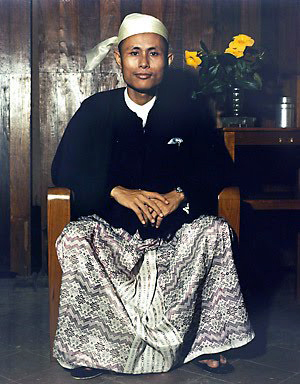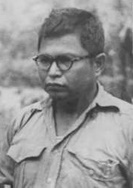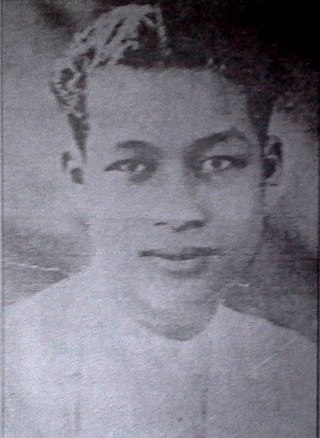Related Research Articles

Aung San was a Burmese politician, independence activist and revolutionary. He was instrumental in Myanmar's struggle for independence from British rule, but he was assassinated just six months before his goal was realized. Aung San is considered the founder of modern-day Myanmar and the Tatmadaw, and is commonly referred to by the titles "Father of the Nation", "Father of Independence", and "Father of the Tatmadaw".
The South Seas Communist Party (SSCP), also known as the Nanyang Communist Party, was a communist party in Southeast Asia established in 1925 when the Chinese Communist Party dissolved its overseas branches in Nanyang to make way for the creation of local communist parties. The SSCP succeeded earlier efforts by the Indonesian communist Tan Malaka to establish communist parties in the region.

The Anti-Fascist People's Freedom League (AFPFL) was the dominant political alliance in Burma from 1945 to 1958. It consisted of political parties and mass and class organizations.

Thakin Than Tun was a Burmese politician and leader of the Communist Party of Burma (CPB) from 1945 until his assassination in 1968. He was uncle of the former State Counsellor of Myanmar Aung San Suu Kyi.

Thakin Soe was a founding member of the Communist Party of Burma, formed in 1939 and a leader of Anti-Fascist Organisation. He is regarded as one of Burma's most prominent communist leaders.

The first fourteen years of independent Burma (Myanmar) were marred by several communist and ethnic insurgencies. Prominent insurgent groups during this period include the Communist Party of Burma led by Thakin Than Tun, the Communist Party (Burma) led by Thakin Soe, the People's Volunteer Organisation led by Bo La Yaung, the Revolutionary Burma Army (RBA) led by communist officers Bo Zeya, Bo Yan Aung and Bo Yè Htut, and the Karen National Union (KNU).
The Shan State Communist Party was a communist party in Shan State, Burma. The party was founded in 1956 by Moh Heng, a commander of the Communist Party of Burma in Lawksawk, in protest of a decision by the CPB leadership to reject the creation of a separate party committee for Shan State.
Thakin Lwin was a Burmese politician and trade unionist, writer and journalist. He was a leading member of the anti-colonial Dobama Asiayone movement, a parliamentarian, the president of the Trade Union Congress (Burma) and a prominent leader of the Burma Workers and Peasants Party.
The Trade Union Congress (Burma) was a central trade union organization in Burma. The TUC(B) was founded by the Socialist Party in November 1945, in an attempt to counter the influence of the communist-led All Burma Trade Union Congress. Ba Cho was the President of TUC(B). The TUC(B) was an affiliate of the governing Anti-Fascist People's Freedom League.

The Communist Party of Burma (CPB), also known as the Burma Communist Party (BCP), is a clandestine communist party in Myanmar (Burma). It is the oldest existing political party in the country.
The Conference of Youth and Students of Southeast Asia Fighting for Freedom and Independence, also referred to as the Southeast Asian Youth Conference, was an international youth and students event held in Calcutta, India on February 19–23, 1948. It was co-organized by the World Federation of Democratic Youth and the International Union of Students. It has often been claimed that the conference was the starting point for a series of armed communist rebellions in different Asian countries.
Hamendrnath Goshal, also known as Harinarayan Ghoshal or Thakin Ba Tin, was a communist politician and trade union leader in Burma, of Bengali Hindu origin. Goshal was one of the foremost leaders of the Communist Party of Burma and the most prominent theoretician of the party for several years. During the height of the Cultural Revolution Goshal was marginalized and killed in an inner-party purge.

The Communist Party (Burma) (Burmese: ကွန်မြူနစ်ပါတီ (ဗမာပြည်)), sometimes referred to as the Red Flag Communist Party (Burmese: အလံနီကွန်မြူနစ်ပါတီ; RFCP), was a communist party in Burma. The party was formed after a more radical faction broke away from the Communist Party of Burma in 1946. In the same year, it began a protracted armed insurgency; first against British rule, then against the Burmese government. The party was led by Thakin Soe, a firebrand communist leader. In the 1970s, the party lost influence and was militarily defeated by 1978.
Thakin Tin Mya was a Burmese politician who served as political commissar in the Seventh Military Region of the Burma National Army.

The United Wa State Party is the ruling party of Wa State, an autonomous region in northern Shan State, Myanmar (Burma). It was founded on 3 November 1989 as a merger between the Burma National United Party (BNUP) and several smaller, non-communist Wa groups. Its armed wing is the United Wa State Army (UWSA), and its chairman and commander in chief is Bao Youxiang.

Kyaw Nyein, called honorifically U Kyaw Nyein, was a Burmese lawyer and anti-colonial revolutionary, a leader in Burma’s struggle for independence and prominent politician in the first decade after the country gained sovereignty from Britain. He held multiple minister portfolios in the government of Prime Minister U Nu, served as General Secretary of the ruling political alliance, Anti-Fascist People's Freedom League (AFPFL), and was joint General Secretary of the Burma Socialist Party (BSP).

The communist insurgency in Burma was waged primarily by the Communist Party of Burma and the Communist Party (Burma) from 1948 to 1989. The conflict ended when the CPB, severely weakened by an internal mutiny, disbanded its armed wing.
The 2nd Congress of the Communist Party of India was held in Calcutta, West Bengal from 28 February to 6 March 1948. At the Second Party Congress, the party line shifted dramatically under the new General Secretary B.T. Ranadive and subsequently the party engaged in revolutionary insurrections across the country.

Thakin Ba Hein was one of the founding members of the Communist Party of Burma, formed in 1939. He was considered the father of "true communism" in Burma by the Communist Party of Burma (CPB).
Thakin Ba Thein Tin was a Burmese communist and the chairman of Communist Party of Burma (CPB) from 1975 to 1989.
References
- 1 2 Seabury Thomson, John. Marxism in Burma, in Trager, Frank N (ed.). Marxism in Southeast Asia; A Study of Four Countries . Stanford, Calif: Stanford University Press, 1959. p. 26
- ↑ Butwell, Richard. U Nu of Burma . Stanford, Calif: Stanford University Press, 1969. p. 29
- ↑ Lintner, Bertil. The Rise and Fall of the Communist Party of Burma (CPB) . Southeast Asia Program series, no. 6. Ithaca, N.Y.: Southeast Asia Program, Cornell University, 1990. pp. 11, 57
- ↑ Lintner, Bertil. The Rise and Fall of the Communist Party of Burma (CPB) . Southeast Asia Program series, no. 6. Ithaca, N.Y.: Southeast Asia Program, Cornell University, 1990. pp. 13, 57
- ↑ Seabury Thomson, John. Marxism in Burma, in Trager, Frank N (ed.). Marxism in Southeast Asia; A Study of Four Countries . Stanford, Calif: Stanford University Press, 1959. p. 33
- ↑ Seabury Thomson, John. Marxism in Burma, in Trager, Frank N (ed.). Marxism in Southeast Asia; A Study of Four Countries . Stanford, Calif: Stanford University Press, 1959. p. 34
- ↑ Trade Union Conference of Asian and Australasian Countries. Working Class in the Struggle for National Liberation: Reports and Resolutions of the Trade Union Conference of Asian & Australasian Countries Called by the World Federation of Trade Unions . Bombay: People's Pub. House, 1949. 108
- 1 2 Trade Union Conference of Asian and Australasian Countries. Working Class in the Struggle for National Liberation: Reports and Resolutions of the Trade Union Conference of Asian & Australasian Countries Called by the World Federation of Trade Unions . Bombay: People's Pub. House, 1949. p. 109
- ↑ Rosinger, Lawrence K. The State of Asia; A Contemporary Survey . Essay index reprint series. Freeport, N.Y.: Books for Libraries Press, 1971. p. 310